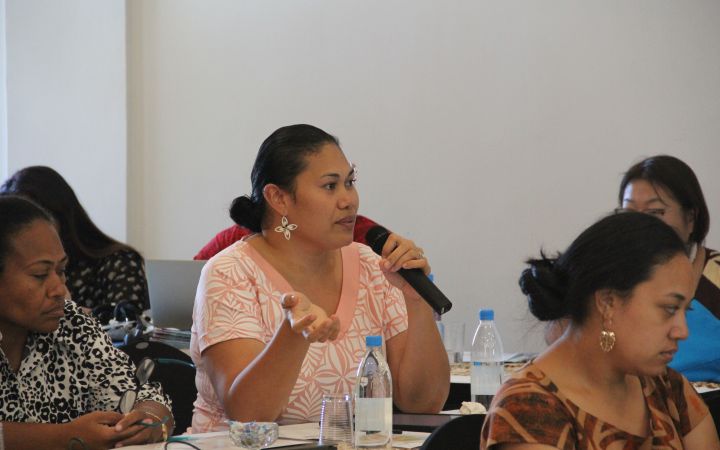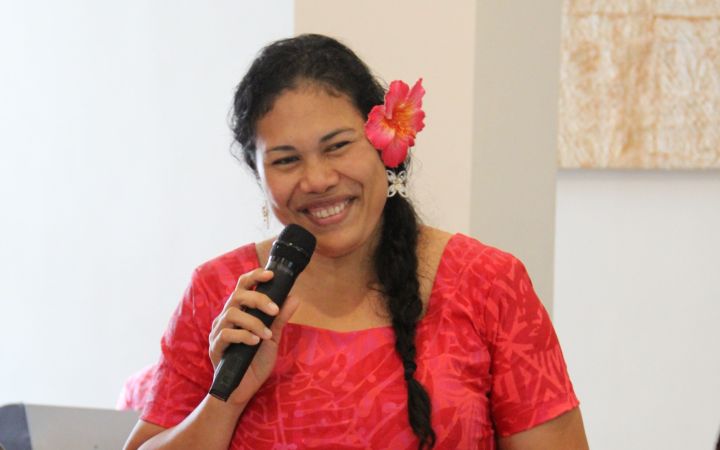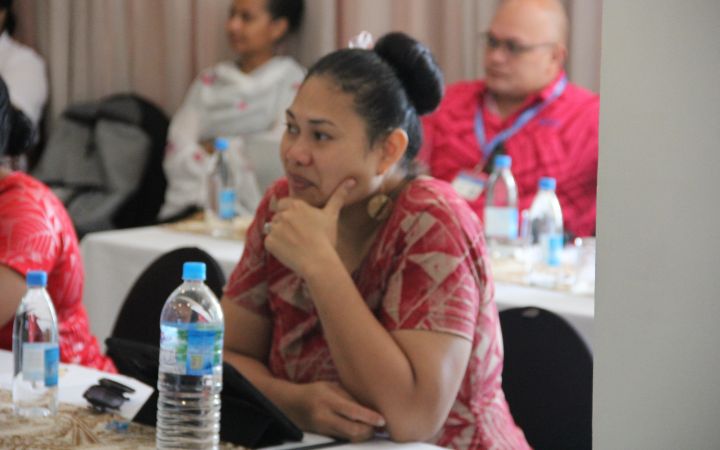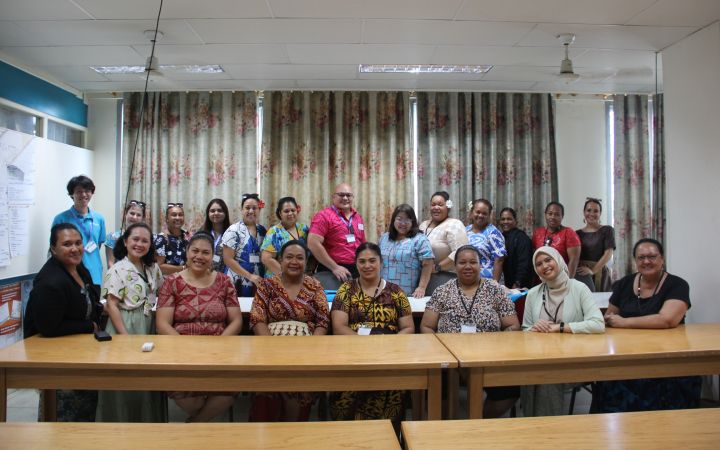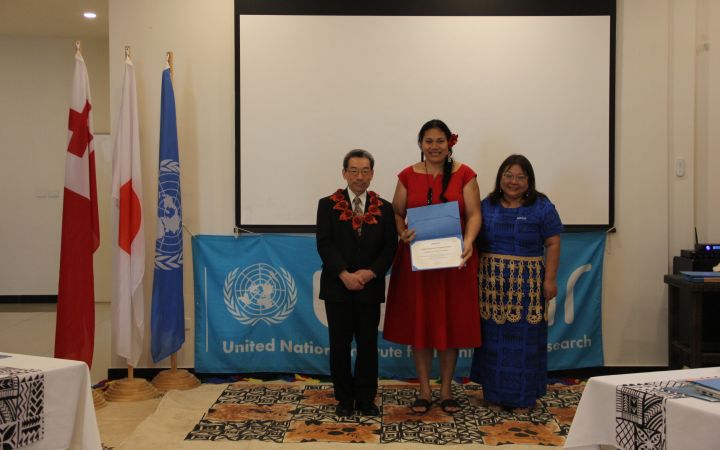- Jewel's passion for disaster risk management stems from personal experiences during disasters, particularly the 2009 tsunami, which highlighted the importance of community preparedness.
- As the Manager of the National Disaster Management Unit in Tokelau, Jewel focuses on community capacity building, emergency management planning, and training for first responders.
- The geographical isolation of Tokelau complicates immediate disaster responses, while the community faces vulnerabilities due to climate change and limited resources.
- Jewel discovered the UNITAR DRR training program through a professional email, finding both online and in-person phases enriching for her professional growth and community-focused initiatives.
- Jewel encourages fellow disaster risk management professionals to embrace continuous learning, prioritise gender-sensitive approaches, and foster community engagement for effective disaster preparedness.
20 November 2024, Hiroshima, Japan - Jewel Luti Leao Tuitama stands as a beacon of hope and strength in the remote atolls of Tokelau, a territory nestled in the South Pacific Ocean. As the Manager of the National Disaster Management Unit within the Ministry of Climate, Oceans & Resilience, her work transcends mere responsibilities; it embodies a profound commitment to her community's safety and resilience against the encroaching threats of climate change and natural disasters. Her ties to the villages of Faleasiu and Solosolo in Samoa, along with her roots in Fakaofo in Tokelau, provide her with a unique perspective on the environmental challenges faced by her people.
It's vital to work hand-in-hand with the community. Disaster preparedness is everyone's responsibility, and we can achieve more by working together.” — Jewel Luti Leao Tuitama, UNITAR training programme alumna, Tokelau
Equipping community with disaster risk reduction skills
Jewel’s professional journey began with a deep-seated belief that community empowerment is key to effective disaster risk management. Her role encompasses various critical areas, including community capacity building, emergency management planning, hazard identification, and program coordination. Each day, she pours her heart into designing educational programs aimed at equipping her community with the skills necessary for disaster preparedness, response, and recovery. Jewel knows that the foundation of a resilient community lies in informed and capable individuals.
Collaboration is essential in her work. Jewel partners with local leaders to craft comprehensive emergency management plans tailored to Tokelau's unique vulnerabilities. Her thorough hazard assessments allow her to pinpoint potential threats, thus enabling proactive risk mitigation strategies. Among her notable initiatives is the Tokelau Disaster Risk Reduction Response and Resilience Plan (TDR4), a structured guideline that enhances disaster management efforts at both the national and village levels.
In addition to planning, Jewel organises training sessions for community first responders, focusing on practical skills like first aid, water sanitation, and search and rescue operations. She recognizes that true resilience stems from a community that is not only informed but also engaged and willing to participate in its own safety. Jewel actively fosters this culture of resilience, encouraging her neighbours to understand the risks they face and the steps they can take to prepare for potential disasters.
Confronting challenges
Jewel’s passion for disaster risk management is deeply rooted in her personal experiences. Growing up in the shadow of natural disasters, she has faced the fear and uncertainty that such events bring. A significant turning point in her life occurred during a devastating tsunami, a harrowing experience that left an indelible mark on her psyche. It was this event that ignited her commitment to making a difference in her community, inspiring her to advocate for disaster preparedness and resilience.
In Tokelau, Jewel confronts numerous challenges. The geographical isolation of the islands complicates immediate access to resources and support during emergencies. With limited personnel and materials for disaster management, she faces the daunting task of increasing awareness about disaster risks among her community members. Jewel also navigates cultural barriers, particularly as a female leader in a predominantly male-dominated field. Nevertheless, she is determined to advocate for gender-inclusive decision-making in disaster risk management, believing that empowering women is crucial to building resilient communities.
The challenges faced by small island developing states (SIDS) like Tokelau are significant, especially in the context of climate change. According to the UNDP Climate Promise, SIDS are on the frontlines of climate-related disasters, which underscores the urgent need for effective disaster preparedness strategies. Jewel understands this pressing reality and recognizes that climate change is intensifying the risks her community faces. “This training has prepared me to address the unique challenges we face in Tokelau, especially with climate change intensifying the risk of natural disasters,” she reflects.
In their publication on the challenges SIDS face in implementing effective disaster risk reduction strategies, the UNDRR highlights several gaps that exacerbate the vulnerabilities of these communities. Jewel is acutely aware of these issues - limited financial resources, insufficient technical expertise, and a lack of institutional frameworks hinder progress. These barriers fuel her determination to create solutions that empower her community.
The skills I gained from UNITAR will help me lead initiatives that build a culture of resilience in my community, ensuring we are better prepared for future disasters,” — Jewel Luti Leao Tuitama, UNITAR training programme alumna, Tokelau
To address these challenges head-on, Jewel has implemented various initiatives, including the TDR4 plan, which aims to bolster disaster preparedness and response across Tokelau. Her community training programs have become a cornerstone of her efforts, providing essential skills to ensure that residents are ready to respond effectively when disasters strike. She emphasises the importance of working hand-in-hand with the community, stating, “Disaster preparedness is everyone's responsibility, and we can achieve more by working together.”
Experience with UNITAR
Jewel’s experiences during disasters have shaped her understanding of community dynamics in crises. She emphasises the importance of being prepared, stating that education and awareness are critical to mitigating the impact of future disasters. Through her work, she continuously seeks to create an environment where her community feels empowered to face challenges head-on.
Jewel's commitment to disaster risk management grew even stronger through her participation in the UNITAR DRR training program. She discovered this opportunity through an email in her professional network, recognising it as a timely chance to enhance her skills. Reflecting on her motivation to apply, Jewel recalled her desire for a hands-on approach to disaster preparedness. The program consisted of two phases, beginning with online training, which provided her with foundational knowledge. However, it was the in-person phase that truly empowered her to create tangible change. During this part of the program, she connected with professionals from across the Asia-Pacific region, sharing experiences and learning from one another. The diversity of perspectives allowed her to expand her understanding of the common challenges faced by small island communities.
At the training, Jewel developed a disaster risk management plan specifically tailored to her community's needs, emphasising the importance of strengthening community-based preparedness. She intends to collaborate with local governments and community leaders to ensure her strategies are effectively implemented and that her community is ready for future disasters.
This training has prepared me to address the unique challenges we face in Tokelau, especially with climate change intensifying the risk of natural disasters.” — Jewel Luti Leao Tuitama, UNITAR training programme alumna, Tokelau
Jewel is particularly passionate about integrating gender-sensitive approaches into disaster risk management. Coming from a traditional society, she recognises the importance of empowering women in leadership roles. “Empowering women in these roles is crucial for building resilient communities,” she asserts, underscoring the program’s emphasis on gender inclusivity. Her gratitude toward the Government of Japan for supporting the UNITAR program is profound; she understands that this training extends beyond personal development; it holds the potential for long-term impacts on her country.
Looking to the future
Jewel's message to her fellow disaster risk management professionals is one of encouragement and solidarity. She advocates for continuous growth and the importance of taking advantage of training opportunities that can provide invaluable platforms for networking and learning from global best practices. “We have to keep growing, and programmes like this are essential for staying ahead in disaster management,” she emphasises. Jewel calls upon women leaders in disaster management to rise and shape the strategies that will prepare communities for the future. “Don’t be shy, don’t be afraid. Take up the opportunity, and together we can build safer, more resilient communities,” she urges.
Through her unwavering dedication and inspiring journey, Jewel embodies the intersection of personal experience and professional growth in disaster risk management. She firmly believes that this field is not just technical but deeply human. “Building relationships, trust, and community resilience is key to reducing the impact of future disasters,” she concludes.
We have to keep growing, and programmes like this are essential for staying ahead in disaster management.” — Jewel Luti Leao Tuitama, UNITAR training programme alumna, Tokelau
In her heart, Jewel knows that her efforts to enhance disaster risk management in Tokelau are more than just professional duties - they are a commitment to her community and future generations. With every program implemented and every individual trained, she inches closer to a vision of a safer, more resilient Tokelau, ready to face whatever challenges the future may hold. As she navigates the complexities of disaster risk reduction, she remains steadfast in her belief that through collaboration, education, and empowerment, the people of Tokelau can face the stormy seas ahead with courage and resilience.
United Nations Online Volunteer Patricia Kroes contributed to this article.
About UNITAR
The United Nations Institute for Training and Research (UNITAR) is a dedicated training arm of the United Nations. In 2023, UNITAR trained over 540,000 learners around the world to support their actions for a better future. UNITAR has a global presence, with offices in Geneva, Hiroshima, New York and Bonn and networks around the world. Find out more at https://unitar.org .


